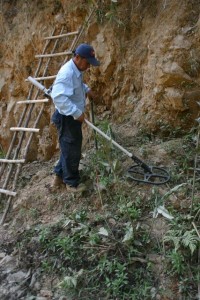Project Phongsali 2011: Takes a licking, keeps on ticking? No. Our equipment requires TLC.

For us to be confident that we've properly cleared land we have to have confidence in our equipment.
Week Three
Day Twenty:
Road conditions here are tough on us and our electronic equipment. Luckily, we humans are largely self-healing. Bounce me down the worst road in the province for a day. I may be coughing dust and spitting mud at the closing bell: stiff, sore, banged up and run down but, even at my age, all it takes is comfort food, cold beer, a warm bath and a night on my full-length, extra-thick, self-inflating, camp pad, and I’m ready to have at it again in the morning.
Not so with our gear. Today, we had an experience that brought home the fact that our equipment needs tender care, thorough inspection, and periodic maintenance.
A lady living near our camp asked us to take care of a bombie that she found under a tree just a short distance from her back door. (The distance was short but the hike was long, because we had to climb, hand over hand, up a near-vertical hill). The woman, not wanting to make the climb, ordered her twelve-year-old son to take us to the bombie.
Now…the boy hadn’t actually seen the bomblet himself but he was confident that he knew which tree his mother was talking about. Before we set out, the lady gave us a very detailed, very specific description of the bomblet and its position relative to the tree.
So… of course, when we got to the tree that the boy identified, our metal detector indicated safe, clear soil. No bomb. (Am I the only one who considers the phrase, “You can’t miss it.” a curse?)
The kid started to sweat a bit as we challenged his choice of trees: “Maybe you’ve got the wrong tree. Could your mother have meant that tree over there? How about this tree? Here’s one that looks a lot like the tree you picked; could this be it?”
Soon, we had spun the kid around so many times, he was hopelessly confused; he couldn’t see the trees for the forest.
Then, playing a hunch, Vilasak returned to where we started, the boy’s first choice and, setting the detector aside, dug in the spot that the boy’s mother had indicated. There, under a couple of inches of leaf matter and loose soil sat the bomblet. Was it possible that ten minutes earlier we’d searched that spot and missed the bombie?
Vilasak ran the detector over the exposed bomblet. No signal. He then held the detector over our steel shovel. Still no signal. Clearly, the detector was malfunctioning, a situation that, undiscovered, might have led us to declare a parcel of contaminated land clear of ordnance.
Later in the day, Vilasak broke the detector down and found a faulty electrical connection that caused it to fail intermittently. It was an easy repair but a humbling lesson. We need to protect our equipment as best we can, and frequently check all our detectors for accuracy.
